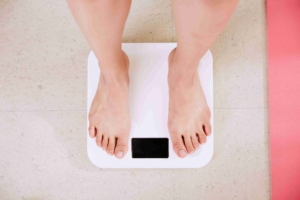Body insecurity can have a powerful impact on mental health. We may be aware of the brain-body connection, but we may have a harder time grasping the concept that how we think about our bodies influences how we feel about ourselves, and our self-worth.
Body insecurity erodes confidence. We take fewer chances for good opportunities. We can feel as if everyone is talking about us and pointing out our flaws. These intrusive thoughts can affect our mental health, but there are ways to overcome body insecurity.
How body insecurity affects mental health.
 Our emotions are tightly wound around our thoughts. When you have thoughts about your body or worry about what other people are thinking, it creates a negative response in the brain. Your body goes into fight-or-flight mode. Suddenly, you no longer want to be where you are or in the company of certain people. You might bail on plans you made months in advance or drop out of a program that you worked hard to get into.
Our emotions are tightly wound around our thoughts. When you have thoughts about your body or worry about what other people are thinking, it creates a negative response in the brain. Your body goes into fight-or-flight mode. Suddenly, you no longer want to be where you are or in the company of certain people. You might bail on plans you made months in advance or drop out of a program that you worked hard to get into.
Some of these scenarios may sound extreme, but body insecurity seeps into your relationships and other areas of your life. The following are common conditions that can develop with body insecurity:
- Anxiety.
- Social anxiety or phobias.
- Depression.
- Eating disorders.
- Body dysmorphia.
- Obsessive-compulsive disorder tendencies.
- Rapid weight gain or loss.
- Insomnia or sleeping too much.
- Low self-esteem.
- Poor confidence.
- Rapid heart rate.
- High blood pressure.
- Shakiness, dizziness, or lightheadedness when in a social situation.
You were never meant to sit on the sidelines of your life. You can move past body insecurity with the right help.
How to move past body insecurity.
Do you remember a time before body insecurity made you self-conscious? Perhaps you were a child and felt the freedom to play without wondering what others thought of your appearance. Or maybe you were a young adult and felt a surge of confidence while out with your friends.
On the other hand, maybe you have never felt confident in your appearance or grew up in a home where your (alleged) flaws were pointed out daily. This can be hard to move past on your own because the voices from the past tend to become your inner voice. But now is the time. Now is the time to take control of your thoughts and emotions stemming from body insecurity and realign them with a positive body image.
When we do not take back control of these thoughts and feelings, they can manifest into harmful behaviors. For example, if you grew up in a household where you were constantly demeaned for your weight or bullied in school because of being overweight, you may grow into an adult who obsesses about your weight and size.
You might find yourself going to extremes with starvation or purging to control your weight. You might force your body into long periods of starvation followed by binges when you feel you have hit a breaking point.
This vicious cycle is dangerous and can lead to the development of serious mental health conditions, such as depression, anxiety, eating disorders, and body dysmorphia. Although professional help is recommended to overcome body insecurity, there are a few lifestyle tweaks you can make that combine well with psychotherapy.
Focus on health, not numbers.
Body insecurity and the resulting lower self-esteem are mental issues. We can trigger a cascade of negative thoughts and emotions when we focus solely on numbers. The number on the scale or the digits stitched into our pants or dresses should not rule our emotions or dictate our day. Yet, we easily fall for this numbers game every morning.
Try focusing on health instead of numbers. Perhaps you could assign yourself small goals that you work toward every day that when compounded will lead to better health. For example, you could make a list of the small daily goals that will help boost your mental and physical health.
Here are a few healthy suggestions:
- Eat within a specific calorie range as deemed appropriate by a nutritionist or doctor.
- Avoid sugar.
- Work out for at least twenty minutes daily.
- Walk 10,000 steps each day.
- Drink eight glasses of water.
- Sleep at least seven hours each night.
- Read for at least fifteen minutes every evening.
- Write in a gratitude journal before bed.
- Spend ten minutes with your Bible and a devotional each morning.
Curate your list, but for starters, keep the list small. Perhaps choose four goals to start that if executed daily will leave you with more confidence. Add another goal when you feel ready, but do not overwhelm yourself. You want to focus on health, not just checking off a to-do list.
Form a supportive inner circle.
Toxic relationships can impact our mental health and body insecurity issues. To overcome the thoughts and emotions, you will probably need to remove these harmful relationships from your life. If there is a toxic person in your life that you cannot remove permanently, then try to spend less time with them. This is for your mental health and self-care.
There are plenty of other people in the world who are battling or have overcome body insecurity issues and know what you are going through. Ask your counselor if they host a support group or if they know of any local ones you can join. You can find online support groups as well for people struggling with negative body image, body dysmorphia, and eating disorders.
Analyze negative thoughts.
 Intrusive thoughts heighten our emotions. They can leave us feeling sad, anxious, stressed, unloved, and unwanted. Intrusive thoughts are not truth. Your brain processes thousands of thoughts daily, some of which you may only be vaguely aware of, but your mind and body respond.
Intrusive thoughts heighten our emotions. They can leave us feeling sad, anxious, stressed, unloved, and unwanted. Intrusive thoughts are not truth. Your brain processes thousands of thoughts daily, some of which you may only be vaguely aware of, but your mind and body respond.
Sometimes it takes counseling to help you to identify negative thoughts and analyze them. What brought on that thought? How did you feel about it? How did you react? Did one thought turn into a cascade of demeaning self-talk and hurtful feelings?
We are our own worst critics. However, God did not create us to criticize our appearance but to remember that we are made in His likeness and image. It is our responsibility to care for the mind and body God gave us until we pass into Glory. That all starts with catching negative thoughts and learning how to reframe them into positive ones that serve your mental health.
Dress to feel good.
Although this lifestyle tweak may seem simple, it has enormous benefits for your confidence. Dress to feel good. This does not mean that you need to wear the most expensive items in the room. It means that you choose clothing and accessories that leave you feeling confident, no matter what size or cost of the clothing.
Stop telling yourself that you are going to dress nice when you (fill in the blank). We cannot control everything in our lives, so we need to appreciate each day and work toward feeling confident in our appearance – now.
You can find wonderful finds at amazing prices at outlet stores, thrift shops, and consignment shops. You can also look online to find experts on how to dress well for your body shape. Taking care of your appearance is not vain; it is a natural mood booster. You may find that when you dress well, you walk differently. You may look people in the eye more and take bigger risks that could benefit you and your family.
a natural mood booster. You may find that when you dress well, you walk differently. You may look people in the eye more and take bigger risks that could benefit you and your family.
Seek professional help.
Body insecurity is prevalent in society and can take a toll on mental health. If negative body image is disrupting your life and relationships, reach out to a mental health professional today. You can contact our office and one of our receptionists will connect you with a counselor.
You do not have to go it alone. Stop allowing body insecurity to hold you back. Seek professional help and give us a call today.
“Weigh-In”, Courtesy of I Yunmai, Unsplash.com, CC0 License; “Measured Fork”, Courtesy of Diana Polekhina, Unsplash.com, CC0 License; “Getting Steps In”, Courtesy of Arek Adeoye, Unsplash.com, CC0 License; “Victory”, Courtesy of Miguel Bruna, Unsplash.com, CC0 License










